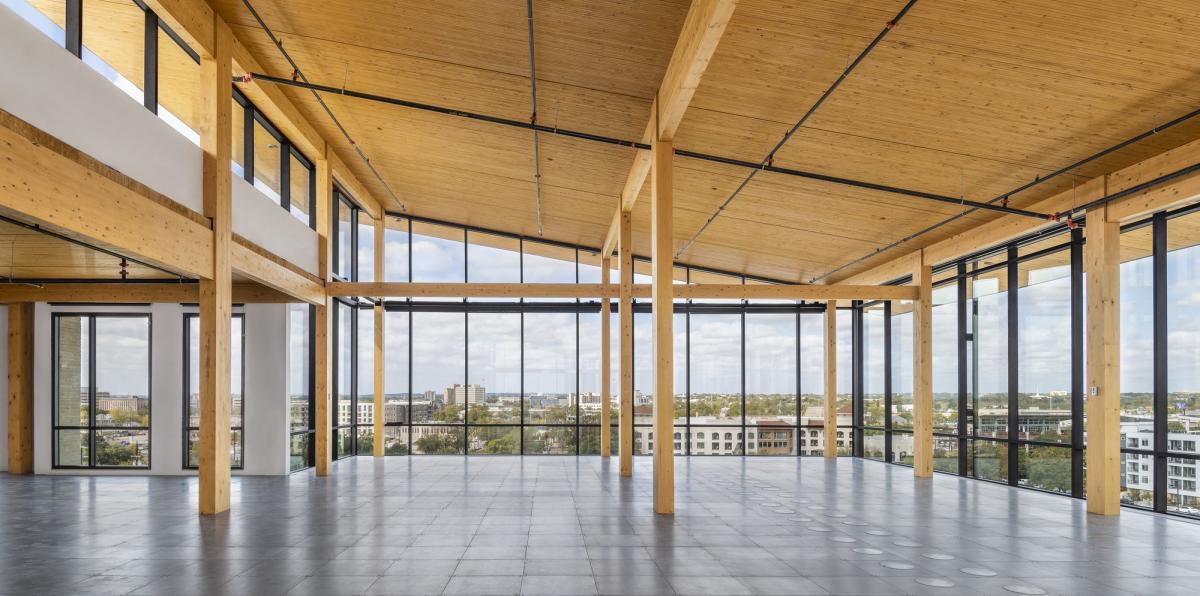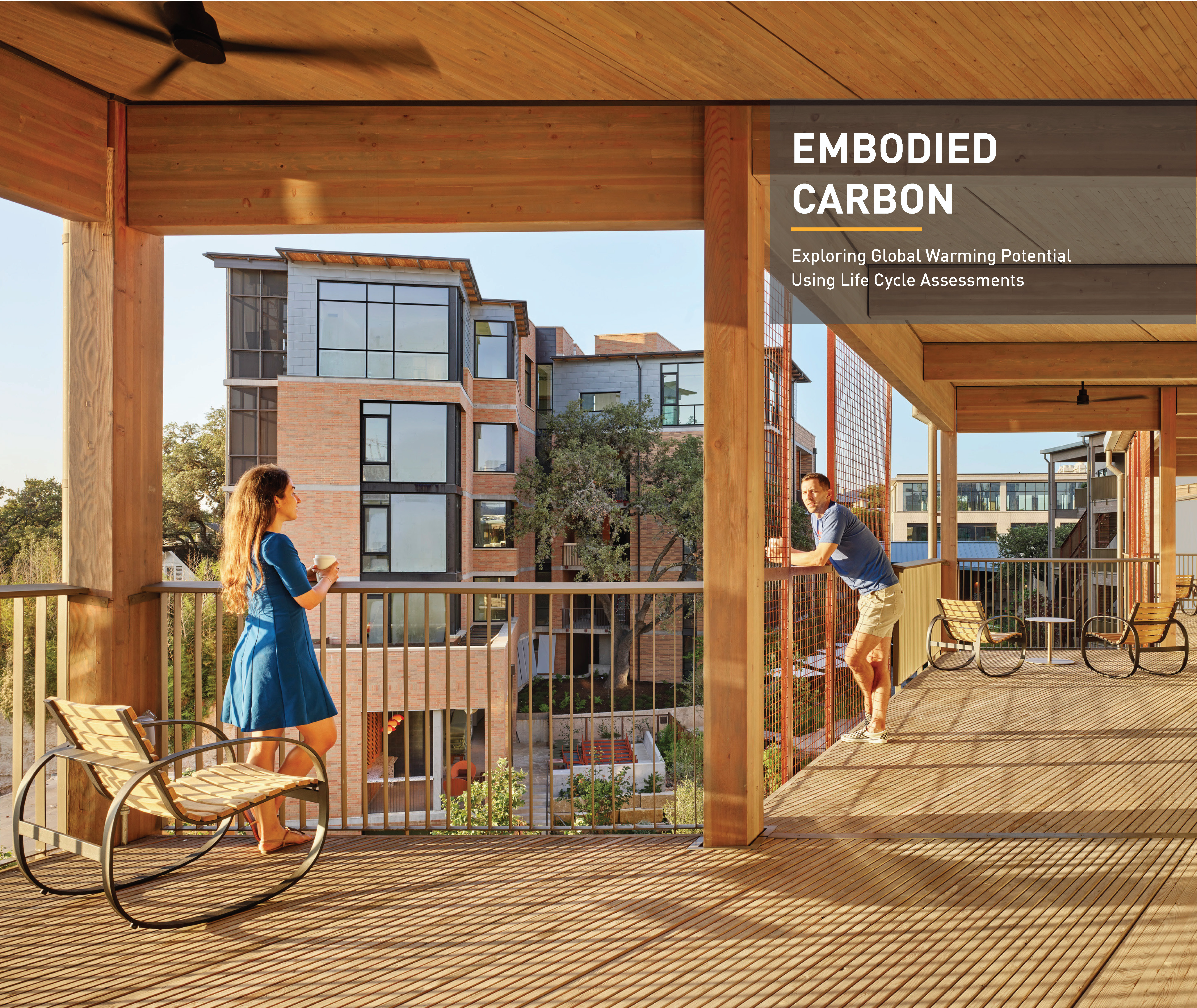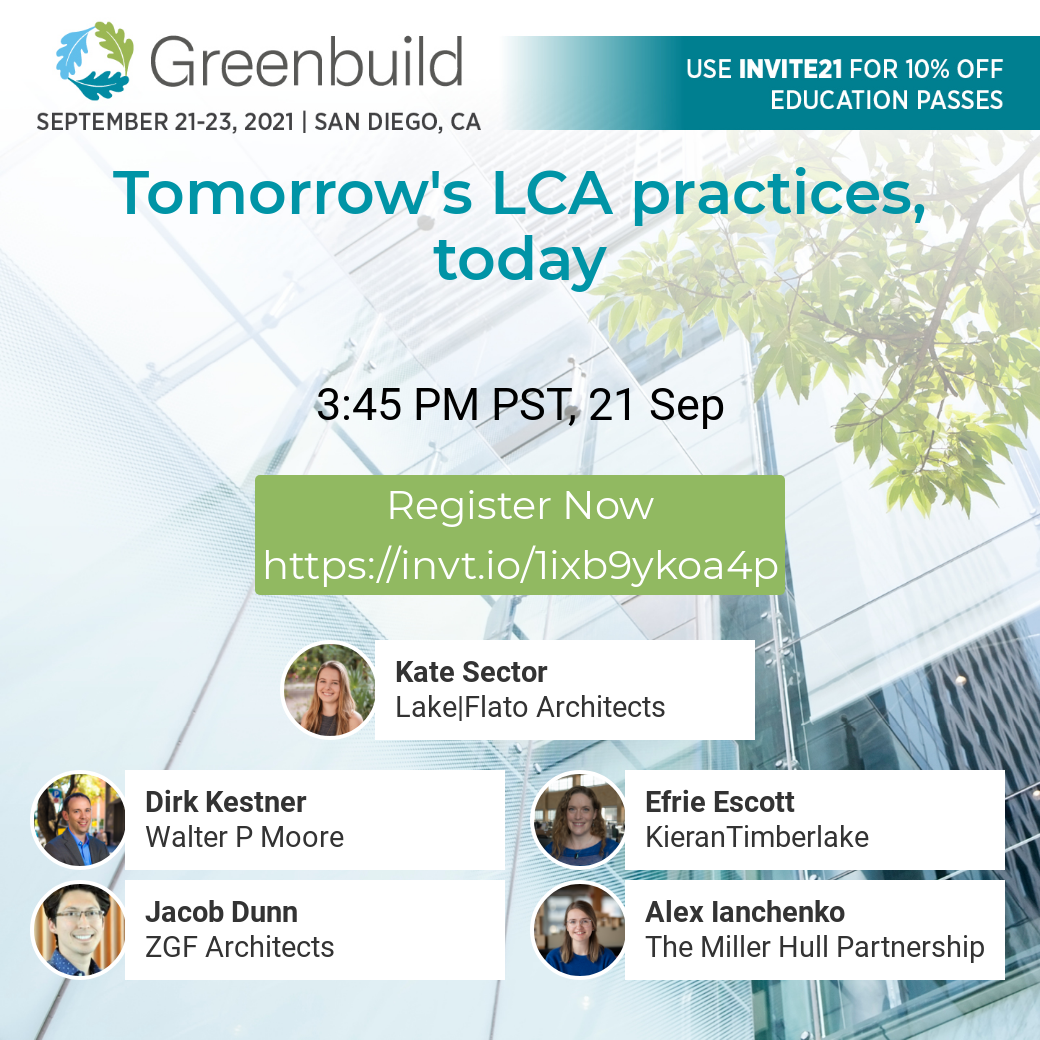THE DOGRUN
a place to share ideas


Embodied Carbon Update: Investigations and Greenbuild
Posted by Kate Sector on 9/15/21 at 11:05 am
Embodied Carbon Update: Investigations and Greenbuild
In 2009, Lake|Flato began its carbon reduction journey when we adopted the 2030 Challenge and started tracking operation carbon on all projects. Carbon is also known as the greenhouse gas emissions (GHG) associated with global warming potential (GWP). Buildings account for 39% of global GHG emissions, making it a high priority for designers to help reduce carbon through both operational and embodied methods. Embodied carbon specifically refers to the GWP associated with the GHG emissions produced during a material’s full life cycle (extraction to end of life).
In 2017, we held an internal sustainability retreat where we discussed our current progress on carbon reduction as well as the importance of understanding embodied carbon impacts. This conversation led to the formation of our Research and Development program, known as “Investigations,” which ultimately guided our initial embodied carbon journey and integration throughout the design process. We are excited to share that we have now published our first embodied carbon journal called Embodied Carbon | Exploring Global Warming Potential using Life Cycle Assessment, and we will be presenting our journey and findings at GreenBuild 2021 during a panel discussion called "Tomorrow's LCA practices, today" . To learn more about either see the abstracts and links below:

Embodied Carbon | Exploring Global Warming Potential using Life Cycle Assessment
Research Question: What is the carbon impact of materials being used in Lake|Flato’s projects and how can designers quantify and reduce those impacts?
Abstract: The built environment is a substantial contributor to Global Warming Potential (GWP) through the fossil fuels required to operate buildings as well as the embodied energy and carbon of all the materials needed to construct it. This research will cover an introduction to embodied carbon and life cycle assessment (LCA) and will investigate workflow methods for conducting LCAs with tools such as Tally. It will then present four case studies that show how to perform LCAs at key design stages to estimate carbon impacts of material selection. Finally, it will show how to use this information to make the critical design choices that will reduce a building’s carbon footprint and subsequent contribution to climate change as well as suggest future research and exploration.
Read the whole presentation here: Investigations | Lake Flato

Greenbuild 2021 Presentation: "Tomorrow's LCA practices, today"
Lake|Flato will be participating in a panel session at Greenbuild on Tuesday, September 21, 2021 – 3:45 PM – 5:15 PM PST.
Presenters:
- Efrie Escott (Kieran Timberlake): Introduction and Moderator
- Kate Sector (Lake|Flato Architects): LCA-Integrated Design Process
- Alex Ianchenko (Miller Hull Partnership): Firm-level LCA benchmarking and data visualization
- Jacob Dunn (ZGF): Wood LCA, upstream and downstream accounting
- Dirk Kester (Walter P. Moore): Rapid structural assessments
Session Overview:
With the inclusion of life cycle analysis (LCA) into LEED BD+C V4.1 Materials credit: Building Life-Cycle Impact Reduction, whole building LCA has grown from a fringe practice to a key aspect of building performance. Firms are now adopting LCA methods to bring about substantial reductions in lifecycle environmental impacts of their designs. This panel will share a wide range of emergent methodologies that advance the current practice of whole building LCA, and discuss how they can be used to realize environmental impact reductions in practice.
Panel moderator Efrie Escott (KieranTimberlake) will introduce the current state of LCA in the AEC industry and significant initiatives that are set to change the practice in the coming years. This introduction will be followed by four 10-minute panlist presentations that demonstrate four next-generation LCA concepts. Kate Sector (Lake|Flato Architects) will set the stage by describing how Lake|Flato successfully integrates LCA throughout their project design process. Alex Ianchenko (Miller Hull Partnership) will discuss firm-level whole building LCA benchmarking, and the use of data visualization tools to improve communication and quality assurance processes. Jacob Dunn (ZGF) will share a newly-launched, publicly-available tool that appends factors to embodied carbon data describing wood products to reflect and quantify the implications of different sourcing scenarios. Dirk Kestner (Walter P Moore) will share the Revit-based “blob” model approach, which enables the rapid assessment of structural systems and concrete mix designs through the lens of structural performance and carbon. These presentations will be followed with a discussion of how the panelists envision other firms applying their emergent LCA methodologies when analyzing critical design choices. The session will conclude with the panelists offering their thoughts on what they see as the next LCA challenge, before opening up the session to audience questions.
Conference registration: GREENBUILD INTERNATIONAL CONFERENCE & EXPO 2021 (informaconnect.com)
Browse Sessions: Greenbuild 2021 Full Conference Schedule (All Times Pacific Daylight Time UTC-07:00) (eventscribe.net)
